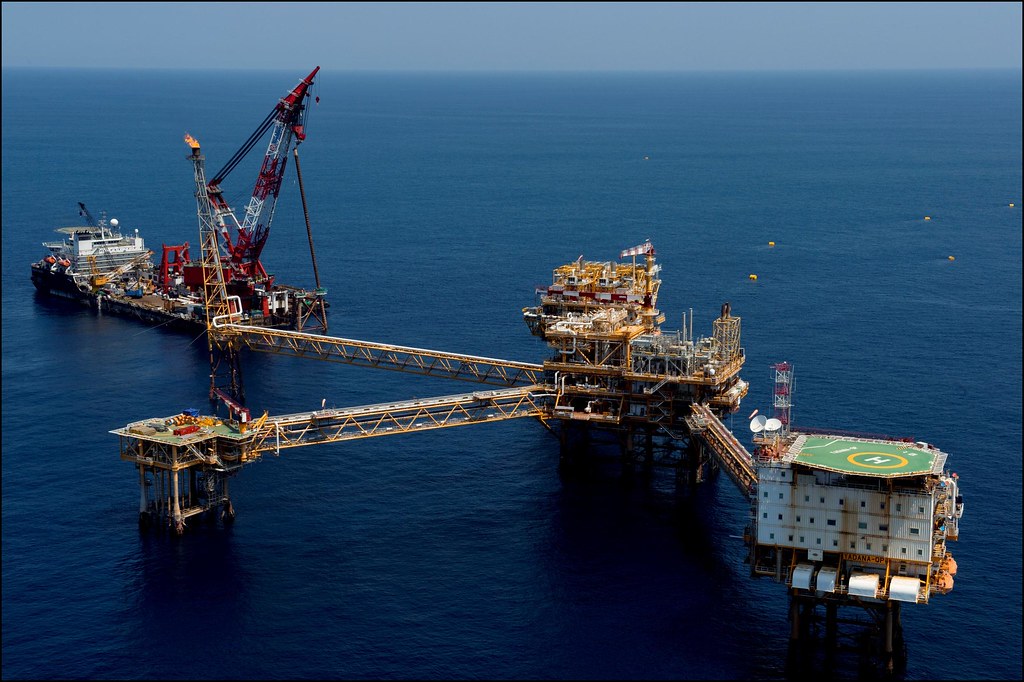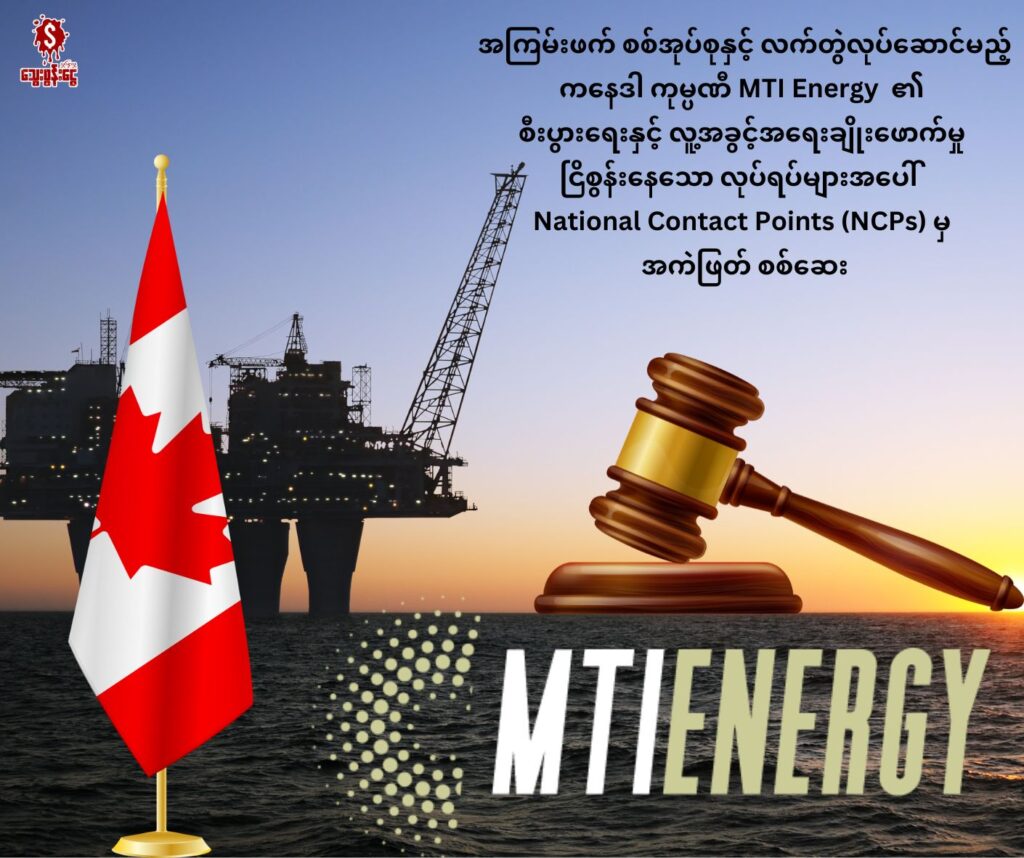In Myanmar, one of the most active conflict zones globally, international businesses are still pursuing deals that risk directly financing the junta’s atrocities against civilians.
Since the military coup began in 2021, more than 5,000 civilians have been killed, 3.3 million people displaced, and over 27,000 arrested. Reports of torture, sexual violence, and other grave human rights violations are widespread.
UN experts have found the junta responsible for genocide and crimes against humanity and have repeatedly called on businesses and investors to sever ties with the military.
Despite these warnings, foreign investment continues to flow into projects that enrich, empower, and legitimize the junta, enabling it to continue its atrocities.

The Case of Yadana
Yadana is an offshore gas field project located in the Gulf of Moattama, Myanmar. In 2023, Canadian oil and gas company MTI Energy planned to acquire Chevron’s stake in the Yadana gas project, becoming its largest shareholder.
Investing in Myanmar’s offshore gas sector requires entering into a joint venture with the Myanma Oil and Gas Enterprise (MOGE) – a state-controlled body involved in all oil and gas projects in Myanmar.
MTI Energy’s investment, and similar investments in oil and gas projects, would have therefore funneled money directly to the junta, which seized MOGE’s offices shortly after the coup in 2021.
Natural gas exports remain the junta’s largest source of foreign revenue, which it needs to purchase weapons from abroad and carry out its systematic attacks on civilians.
United Nations experts have made clear that the junta is not a legitimate governing body and cannot represent the state in commercial contracts. Despite this and repeated warnings that Yadana’s revenues fund atrocities, Thailand’s partially state-owned PTTEP, now the operator of Yadana, along with former shareholders Chevron and TotalEnergies, treated the junta as their legitimate counterpart and facilitated millions of dollars in revenue transfers to MOGE.
These companies did not use all the tools at their disposal to prevent or mitigate these impacts, such as by diverting payments into an escrow account or referring the question of whether the junta was the legitimate government of Myanmar to arbitration. In doing so, they contributed to human rights abuses, in breach of international standards on responsible business conduct.
EarthRights Takes a Stand Against Financing the Junta
MTI’s proposed investment prompted EarthRights International and a Myanmar civil society group to file a complaint with the National Contact Points (NCPs) of Canada and the United Kingdom for the OECD Guidelines for Multinational Enterprises on Responsible Business Conduct (OECD Guidelines).
The complaint argued that entering into negotiations with MOGE lent the junta legitimacy and likely reassured military leaders that foreign investors would continue to facilitate access to Yadana revenues, therefore contributing to ongoing human rights abuses.
The Canadian NCP found that MTI Energy’s proposed investment did indeed raise questions over whether it would be contributing to human rights abuses, but MTI Energy delayed the process, refusing offers to meet concerned stakeholders. MTI Energy later withdrew its proposed investment in Yadana for reasons they did not publicly disclose.

News Deals, Same Risks
Although the risks are clear, new foreign investments continue with MOGE.
The Singapore-based Canadian Foresight Group has announced plans for an offshore drilling campaign, Block M-15. In addition, Thai company Gulf Petroleum Myanmar Co Ltd signed a multi-million dollar production-sharing agreement with MOGE for the Min Ye Thu gas project in May 2025. This will be the first venture of its kind since the coup began.
These examples highlight a broader, disturbing trend: numerous international companies, particularly in the oil and gas sector, continue to treat Myanmar’s military as a legitimate business partner, despite overwhelming evidence of its atrocities.
This suggests that some international companies are either failing to conduct enhanced human rights due diligence required in conflict-affected areas like Myanmar, or willfully ignoring its findings. It also reinforces what advocates have been saying for years: voluntary frameworks alone are not enough to prevent or address corporate abuses.
Binding rules on corporate conduct, combined with stronger government oversight, are needed to ensure businesses like Canadian Foresight Group and Gulf Petroleum do not contribute to and profit from grave human rights violations in Myanmar.
Binding Rules and Stronger Oversight
Our complaint against MTI Energy underscores broader, systemic challenges with the way most accountability mechanisms such as NCPs handle complaints. These mechanisms need to be strengthened to ensure they facilitate access to remedy and promote responsible business conduct.
NCPs should assess claims even if a company refuses to engage; otherwise, companies can unilaterally shut down the process. NCPs should also issue determinations on whether a company fails to meet the OECD Guidelines, and provide specific recommendations for improvement.
Making human rights due diligence mandatory is another vital step. Thailand and South Korea are currently moving forward with legislation to that effect, which could set an important precedent in Asia.
Thailand’s draft law would require companies to identify, prevent, and address human rights and environmental impacts in their supply chains. If these laws are enacted, PTTEP, Gulf Petroleum, and Posco International’s investments in Myanmar’s gas sector would face real scrutiny and possible civil penalties.
Targeting the Junta’s Financial Lifelines
As part of the state’s duty to protect against corporate abuses, governments should be using targeted sanctions to cut off the junta’s financial lifelines while protecting civilians. The EU has already blocked revenues from the Shwe gas project through sanctions. The U.S., meanwhile, imposed partial sanctions on MOGE in October 2023, but loopholes allowed payments to continue. Full sanctions on MOGE are urgently needed.
In addition, governments must sanction the Myanma Economic Bank (MEB), which now handles payments for the junta’s arms purchases, international taxes and fees, and the repatriation of foreign revenues from state-owned enterprises, including MOGE. According to Myanmar activists and experts, few civilians use MEB, so sanctions would directly hit the junta without harming the general population.
The BRAVE Burma Act, introduced in the U.S. Congress in May 2025, represents a critical step forward. The bipartisan bill would require the U.S. President to annually assess whether to impose stronger sanctions on Myanmar’s state-owned enterprises, financial institutions, and foreign entities supplying aviation fuel. Passing this legislation would signal that governments are serious about cutting off the junta’s access to funds and resources.
Governments Must Act Now to End Corporate Complicity
For nearly five years, the junta has waged a brutal campaign of violence, including deadly airstrikes, against the people of Myanmar, enabled by businesses and financial institutions that continue to engage with the junta and its affiliated companies.
That companies are maintaining ties with the junta, which stands accused of genocide and crimes against humanity, shows that voluntary principles for responsible business conduct are not enough.
Without mandatory due diligence laws, stronger accountability mechanisms, and targeted sanctions, businesses will continue to prioritize profits over people.






